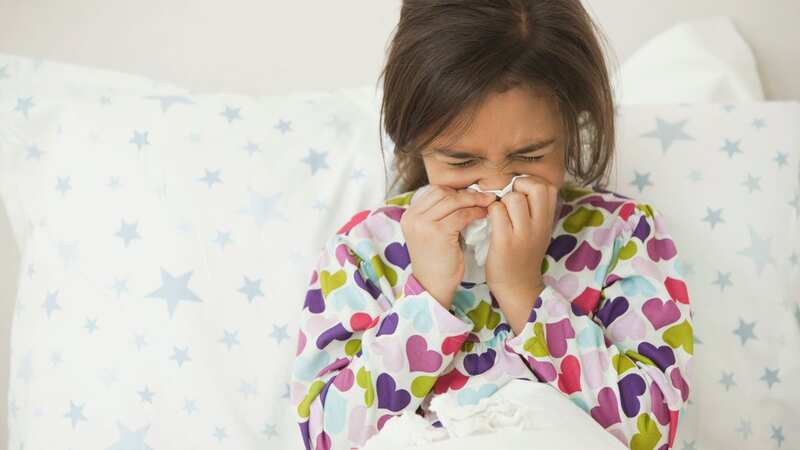What are the early symptoms of RSV as cases of winter virus rocket in children

Around 33,500 children under five years-old are hospitalised from respiratory syncytial virus (RSV) every year in the UK - but what are the early symptoms to watch out for?
According to the NHS, RSV is a "common" condition that infects nearly all children by the time they reach two years-old. The UK Health Security Agency (UKHSA) estimates that more than 60 percent of children have been infected by their first birthday, and over 80 percent by their second.
However, cases have started to soar since social distancing restrictions have eased. Latest government data has revealed that RSV positivity rate increased to 10.68 percent, as of October 30. The highest positivity group currently in the UK was found in those aged under five years old at 39.4 percent.
In some cases, the virus can cause bronchiolitis, which is a lower respiratory tract infection that in some instances can be severe. This is especially the case for those under the age of two, notes the NHS. UK Parliament warns that infants under six months are more likely to develop the most severe disease - such as bronchiolitis and pneumonia - which could result in hospitalisation.
Dr Conall Watson, Consultant Epidemiologist at UKHSA, said: "UKHSA (UK Health Security Agency) surveillance shows that – as is expected as we head into winter – many young children are now needing NHS assessment and care for conditions like bronchiolitis caused by RSV. RSV infections are usually mild but can cause breathing difficulties in babies and the elderly. Initial symptoms in infants are similar to a cold but can go on to include breathing more quickly or noisily and having difficulties feeding."
 Teachers, civil servants and train drivers walk out in biggest strike in decade
Teachers, civil servants and train drivers walk out in biggest strike in decade
While UKHSA highlights that very young children are most prone to RSV, it adds that elderly people face a risk of the illness too. Young infants born prematurely, or with underlying chronic lung disease, and elderly people with chronic disease, face a greater risk of developing severe disease, adds UK Parliament.
A 2015 study, published in the National Library of Medicine, found that high-risk elderly people were twice as likely to have a RSV-related GP episode or to die from RSV-related causes than low-risk elderly people. Those considered high-risk were four times more likely to be hospitalised for RSV than the low-risk group.
Symptoms of RSV
Symptoms of RSV usually present within four to six days after being infected. According to the NHS, the most common warning signs include:
A runny nose
Decreased appetite
Coughing
Sneezing
Fever
Wheezing
It’s common for these symptoms to develop in stages, rather than as a collective, and they usually pass within a week or two. The initial symptoms of RSV include congestion, runny nose, fever, cough and sore throat, explains the American Lung Association.
 Greggs, Costa & Pret coffees have 'huge differences in caffeine', says report
Greggs, Costa & Pret coffees have 'huge differences in caffeine', says report
The NHS adds: “In very young infants with the virus, the only symptoms may be irritability, decreased activity, and breathing difficulties.” When it comes to RSV in adults, the American Lung Associates reports a runny nose, sore throat, cough and a headache as tell-tale symptoms.
Everyday Health adds that a “barking” or “wheezing” cough may indicate a more severe infection. If you or your child has cold-like symptoms that are getting worse, or it is causing unusual breathing or problems feeding, you should call NHS 111 or contact your GP practice.
How is RSV spread?
The CDC say the disease is transmissible in a number of ways. These include when:
- An infected person coughs or sneezes
- You get virus droplets from a cough or sneeze in your eyes, nose, or mouth
- You touch a surface that has the virus on it, like a doorknob, and then touch your face before washing your hands
- You have direct contact with the virus, like kissing the face of a child with RSV
Dr Watson concludes: "You can protect yourself and others by washing your hands regularly, using a tissue to catch coughs or sneezes and washing your hands afterwards, and staying away from others if you feel unwell. RSV is another reason why babies need protection from tobacco smoke as this is linked with more severe RSV infections."
Read more similar news:
Comments:
comments powered by Disqus
































